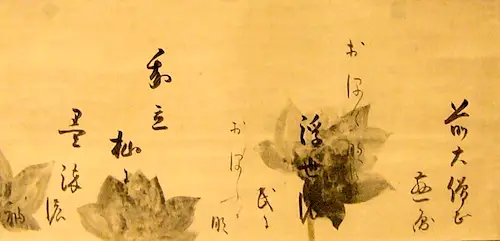A distinctive spoken or written expression.
Turn of phrase
Meaning
What's the origin of the phrase 'Turn of phrase'? – the quick version
‘Turn of phrase’ originated in the 16th century, when it was used to describe the craft of calligraphy. Just as a skilled woodworker could turn a piece of wood on a lathe to create a beautiful object, a skilled writer could turn a phrase to create a beautiful and expressive sentence.
‘Turn of phrase’ became more widely used in the 17th and 18th centuries, and is now used to describe any particularly effective or elegant way of expressing something.
Here is a summary of the main points of the full text below:
- ‘Turn of phrase’ originated in the 16th century, when it was used to describe the craft of calligraphy.
- The earliest known example of the phrase is from Matthew Parker’s The whole Psalter translated into English metre, published in 1567.
- The expression ‘turn of phrase’ is now used to describe any particularly effective or elegant way of expressing something.
What's the origin of the phrase 'Turn of phrase'? – the full story
‘Turn of phrase’ is a commonplace but rather odd expression – in what sense can a phrase be ‘turned’? Ladies are, or at least used to be, sometimes described as having ‘well-turned’ legs/thighs/ankles, but that derives from an allusion to the symmetry and precision of wood turning.
As it turns out, that’s the same imagery which led to ‘turn of phrase’.
What’s a phrase?
What is a phrase anyway? Well, there’s no exact definition and so it depends on who you ask. Had you been around in 1530 when the word ‘phrase’ was coined, you would have been wise not to have asked the language scholar John Palsgrave. It was he who first put the word into print but, confusingly, gave two differing examples of its meaning. Palsgrave’s aim was to help Englishmen to learn to speak French and to that end he published Lesclarcissement de la Langue Francoyse, the first grammar of the French language.
Palsgrave illustrated the meaning of the word ‘phrase’ by giving examples of phrases in English with their French equivalents.
“Whan all is doone and sayd, pour tout potaige – a phrasis.”
In that illustration he was using the meaning of the word as we now understand it, that is, ‘a small group or collocation of words expressing a single notion; a common or idiomatic expression’. That ‘collection of words’ definition of ‘phrase’ is hardly unambiguous and could just as well be used for ‘idiom’, ‘saying’ or ‘expression’. There are also many other linguistic terms that, while they have specialised uses, can all lay claim to being phrases – ‘proverbs’, ‘adages’, ‘maxims’, ‘clichés’ and so on.
Added to that, Palsgrave gave us an entirely different definition of what Tudor gentry understood by the word ‘phrase’, that is, not words at all but a ‘manner or style of speech or writing’. In the same French/English grammar he remarked on “The differences of phrasys betwene our tong and the frenche tong”. He went on to explain “The phrasys of our tong and theyrs differeth”. By that he meant, not that the English and French use different expressions (which even the most untutored student would surely have known) but that the French have a different manner and style of speaking to the English.
How can a phrase be ‘turned’?
phrase’ derives from the art of calligraphy.
That ‘style of speaking or writing’ meaning gives us a lead in explaining how a phrase can be said to be ‘turned’. Before the advent of printing the beauty of written texts was judged not only on their content but also on the quality of the writer’s calligraphy – much as Japanese Haiku is appreciated today. The word ‘style’ derives from the tool used for writing, the stylus, and to the medieval mind writing style was as much about the craft of calligraphy as it was about the ideas conveyed in the text. An early handwritten example of Chaucer’s Clerk’s Tale, circa 1386, used ‘style’ with that meaning:
Therfore Petrak writeth this storie, which with heigh stile he enditeth.
‘turning’ a phrase comes from Matthew
Parker, Archbishop of Canterbury, in 1567.
So, a phrase was a style of speaking or writing, and style meant beauty of expression. We can now interpret a fine ‘turn of phrase’ as analogous to a skilfully crafted piece of wood turned on a lathe.
The earliest example of a phrase being turned that I know of is from the English cleric Matthew Parker’s The whole Psalter translated into English metre, 1567:
Then some in prose: most learnedly, have tourned the phrase and worde.
The first use of the expression ‘turn of phrase’ that I know of is found in Aphra Behn translation A discovery of new worlds from the French, 1668:
The nearer the Idioms or turn of the Phrase of two Languages agree, ’tis the easier to translate one into the other.
See also: Coin a phrase.
[Note: My thanks to Peter Lukacs, ElizabethanDrama.org for the 1567 and 1668 citations.]
The history of “Turn of phrase” in printed materials
Trend of turn of phrase in printed material over time
Browse more Phrases
About the Author

Phrases & Meanings
A-Z
A B C D E F G H I J K L M N O P Q R S T UV W XYZ
Categories
American Animals Australian Bible Body Colour Conflict Death Devil Dogs Emotions Euphemism Family Fashion Food French Horses ‘Jack’ Luck Money Military Music Names Nature Nautical Numbers Politics Religion Shakespeare Stupidity Entertainment Weather Women Work
How did we do?
Have you spotted something that needs updated on this page? We review all feedback we receive to ensure that we provide the most accurate and up to date information on phrases.
